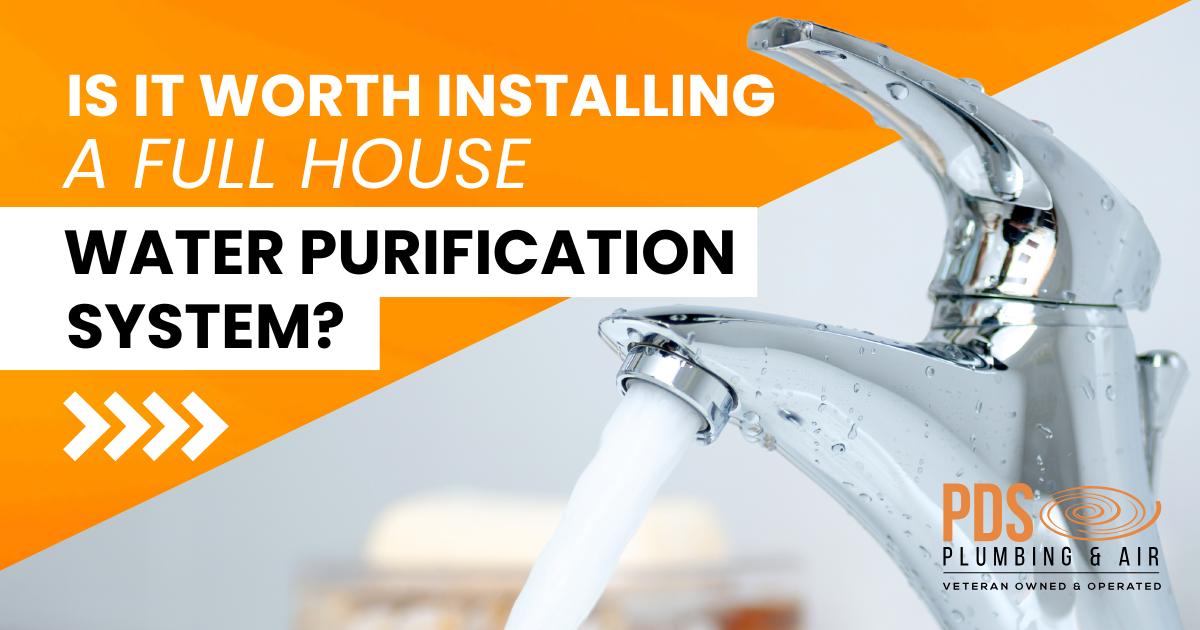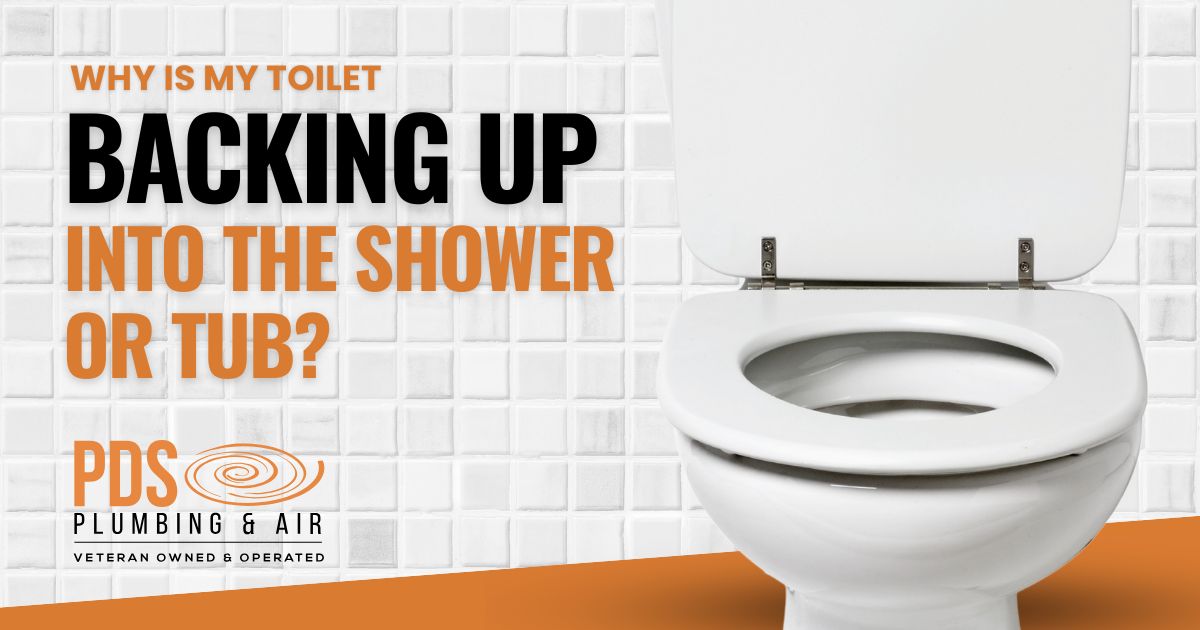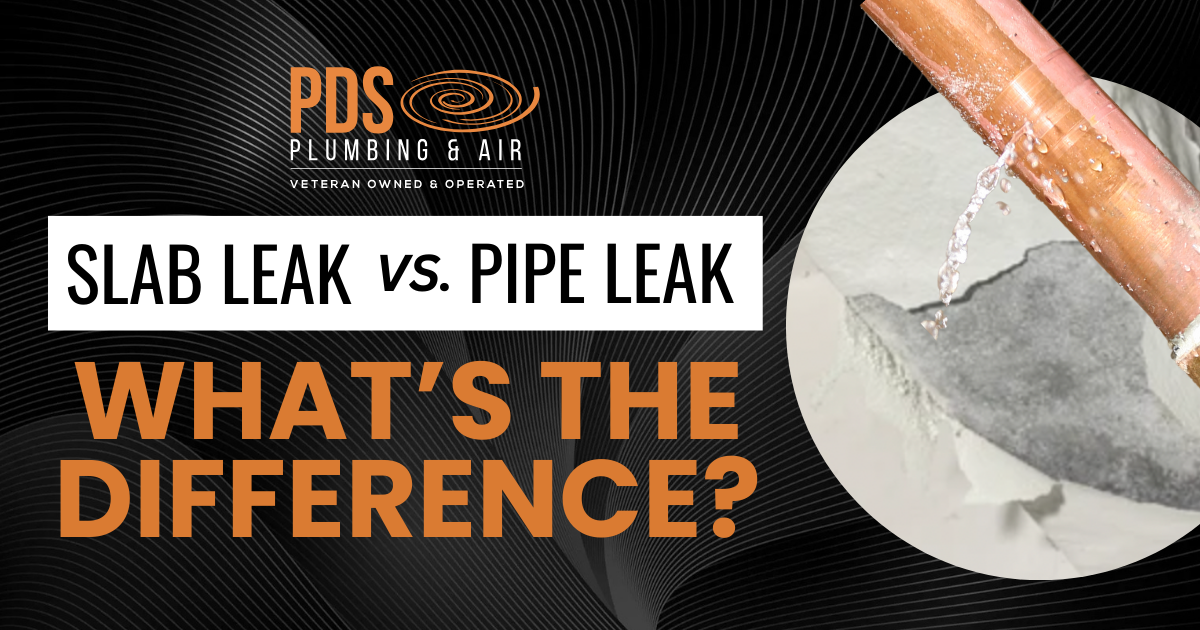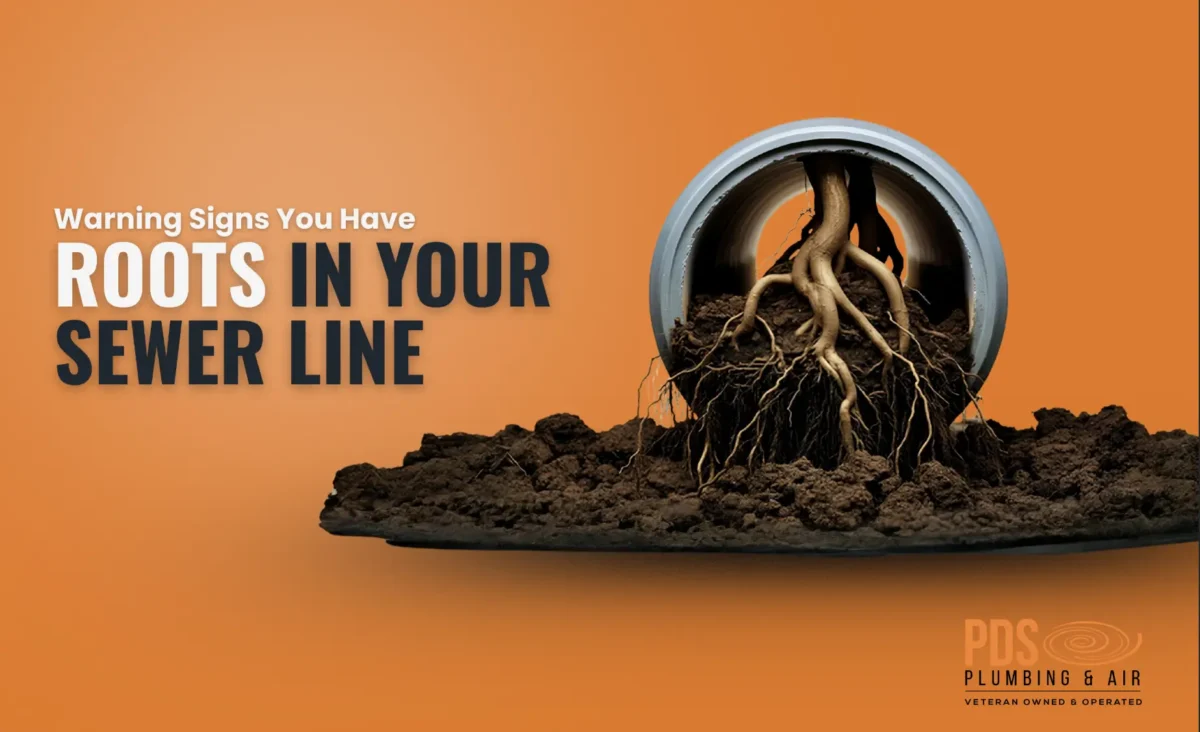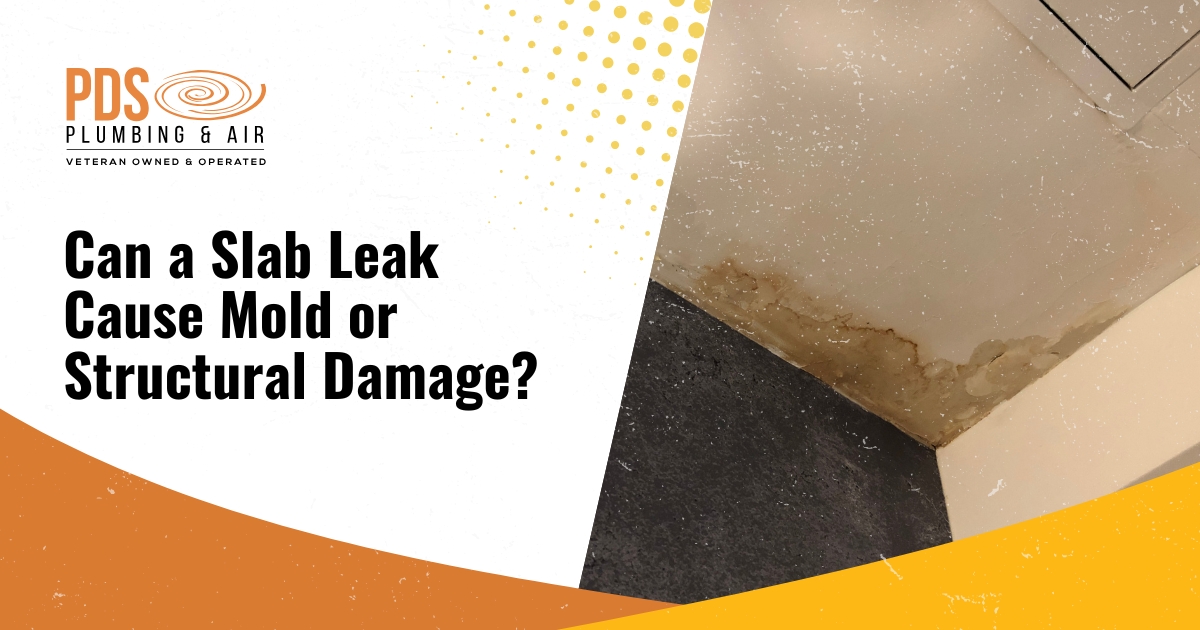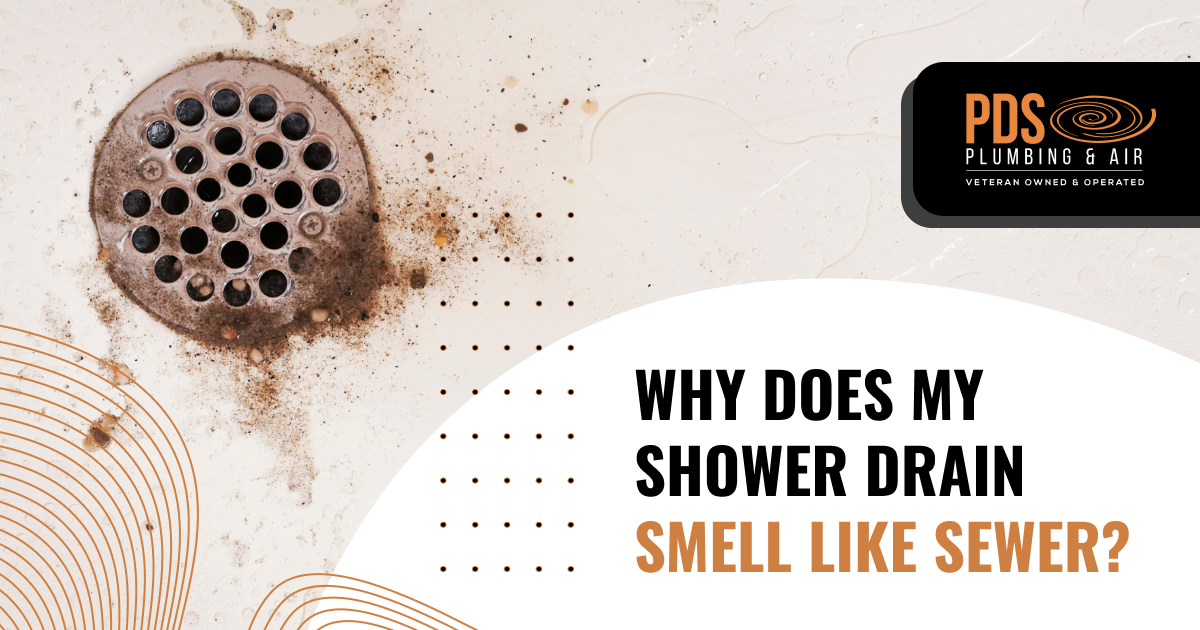
A persistent odor wafting through your bathroom can make your space feel unpleasant and unsanitary. When your bathtub or shower drain smells like sewer, it may signal deeper plumbing issues that require professional drain cleaning services.
Whether your shower drain has biofilm buildup or a clog in the main sewer line, understanding where the smell is coming from, how to address it, and when to call PDS Plumbing and Air helps protect your space from unpleasant drain odors.
Common Reasons for Sewer Odor in Shower Drains
A sewer odor from the shower drain usually stems from buildup, dry traps, or leaks, and each source has specific characteristics.
Clogged drain
Hair, soap, shampoo, and grime build up inside shower drains, eventually restricting the flow of water and emitting unpleasant sewer odors. If water drains slowly or pools around your feet during a shower, a partial blockage is likely the cause.
You may also notice gurgling sounds, water backing up, or a visible ring of residue around the drain opening. These types of clogs tend to accumulate gradually, and ignoring them allows bacteria to multiply and odors to worsen.
A localized blockage in the shower drain is more common than a clog deeper in your system, such as the main sewer line. If the clog is deeper in the line, symptoms such as smells, slow draining, and other issues may affect other fixtures throughout your home, potentially leading to hazardous sewage backups.
Dirty or dry P-trap
The P-trap is a curved section of pipe located beneath the shower that holds water and serves as a physical barrier between your bathroom and the sewer system. If the trap dries out, whether due to leaks or prolonged disuse, sewer gas can escape into the shower. If the trap still has water, it may be dirty from soap, hair, and other debris buildup.
Leaky drainpipe
If the pipe beneath your shower has a crack, damaged joint, or loose fitting, sewer gas can escape before reaching the main vent stack. These leaks aren’t always visible from the bathroom and may occur behind walls or between floors, creating odors that linger even after cleaning. They may also cause water stains, mold growth, or peeling paint on the ceiling below the bathroom. Combined with a persistent odor, these signs point to a hidden leak.
Biofilm or mold buildup
Showers are warm and humid environments that encourage bacterial growth. Biofilm is a slimy layer of bacteria and organic matter that coats the interior walls of pipes and emits a foul odor. You may also find mold in and around the shower base, tile grout, or caulk. Both biofilm and mold may continue to produce unpleasant odors even when water drains normally.
How To Eliminate the Sewer Smell From Your Shower Drain
Before calling a plumber, consider these DIY methods to eliminate sewage smells from your shower drain.
Clean with baking soda and vinegar
For a gentle solution to address minor buildup and smells, pour half a cup of baking soda into the drain, followed by one cup of white vinegar. Let the mixture bubble and react for 15 to 30 minutes, then flush the loosened residue in the drain with hot water. The combination breaks down organic materials and neutralizes smells but may not dislodge tougher clogs.
Plunge the drain
A flat-bottom plunger can dislodge buildup and restore drainage in showers. Cover the overflow opening with a rag, then fill the shower floor with enough water to immerse the edge of the plunger. Place the plunger over the drain and push firmly without breaking the seal, using several quick plunges in a row. If the blockage loosens, the water should drain quickly.
Use a drain snake
A drain snake, also known as an auger, is a simple metal or plastic tool that reaches into drainpipes and dislodges blockages. Insert the snake until you feel resistance, then either break up and push the blockage or rotate the snake and pull the debris out. Repeat as needed until the pipe is clear, and flush the drain with hot water afterward.
Check the P-Trap
Shine a flashlight down the drain to inspect the P-trap. If you don’t see water, run the shower for several seconds to refill the trap. If the smell disappears, the P-trap was likely dry from infrequent use. If the water disappears quickly after filling or continues to smell, it may be damaged or dirty.
When To Call a Plumber for Persistent Drain Odors
If the shower drain smells like a sewer despite trying DIY troubleshooting, the persistent odor may be signaling more significant or complex plumbing problems. Call a plumber if:
- Odors persist even after cleaning, snaking, and flushing the drain.
- The smell worsens with use.
- Water stains, bubbling paint, or mold appear on ceilings or walls near the bathroom.
- The P-trap isn’t accessible and may be leaking or damaged.
- Other drains in the home are smelly, slow, or backing up.
- You hear gurgling sounds when water drains.
Waiting to call a plumber may allow minor problems to escalate into bigger or more urgent situations, such as active leaks or sewage backups. A licensed plumber can inspect the drain line using specialized inspection tools and methods, providing a lasting solution.
How To Prevent Future Sewer Smells in Your Bathroom
Once the odor is gone, keeping your shower and bathroom smelling fresh depends on regular upkeep and responsible plumbing habits. Try these tips to prevent sewer smells from fouling up your bathroom:
- Use a drain cover: Drain covers stop hair and soap scum from entering the pipe, and they’re easy to remove and clean. Clean them weekly or as needed.
- Clean the drain regularly: Once a month, flush the drain with either hot water and dish soap or a baking soda and vinegar mix to break down buildup and neutralize odors. Don’t use boiling water — it can warp and damage PVC pipes.
- Practice responsible flushing: Keep wipes, paper towels, food, and other materials out of showers, sinks, and toilets to slow buildup in your pipes and minimize the risk of clogs.
- Manage humidity: Run the bathroom exhaust fan during and after showering, or open the window to let humidity balance out. Maintaining proper humidity slows mold growth in your shower drain.
- Schedule plumbing maintenance: Plumbers can assess your drain pipes, locate hidden leaks, and catch problems before they worsen. If your system is prone to odors and slow drains, ask your plumber about hydrojetting or other drain cleaning services.
Contact PDS Plumbing & Air for Drain Odor Solutions
Minor issues, such as clogs and dry traps, are often simple fixes. If odors persist around your shower, it’s time for a professional drain line inspection, cleaning, and repair by a PDS plumber. Contact us or schedule a service online today to restore proper flow to your drains and keep your bathroom odor-free.




